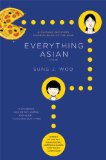Summary | Excerpt | Reading Guide | Reviews | Beyond the Book | Readalikes | Genres & Themes | Author Bio

A Novel
by Sung J. WooExcerpt
Everything Asian
I was waiting to use our apartment’s only bathroom, shifting from foot to foot, when the door burst open and my sister walked out, her eyes raw and puffy, followed closely by Mother, arms tautly alert, ready to catch her if she fell, if she melted, if she died.
My sister had chosen this day, my twelfth birthday, to try to kill herself, or at least pretend to kill herself. Looking back on that day now, I can see it was merely a stunt to gain attention, and even then I think I knew she was bluffing, but still, I couldn’t ignore the blue dish and the paring knife sitting on top of the toilet seat, its tip pointing toward the bathtub like a compass needle. On the dish, a pile of white pills sat like an offering. I put the dish and the knife on the floor and flipped the seat up. As I peed into the bowl, I stared down at the silver edge of the blade, wondering how close it had come to my sister’s wrists.
When I finished, I walked the stuff back to the kitchen. I let the pills roll onto the faded Formica and counted twelve of them. I arranged the tablets on the dish in a circle, placed the paring knife in the center, and mouthed the words “Happy birthday” in English. I wheeled the knife around until it pointed five past seven, the exact time my head would have poked out of Mother’s you-know-what, twelve years ago to this day, the twenty-eighth of February, my squishy eyes slowly unsticking, wondering just why the world had gotten so cold.
*
I called my sister Noona, Korean for “sister.” Her full name was In Sook, and her American name was Susan. She wouldn’t know this until later, but there was another name-in-waiting, Sue, one she would eventually grow into.
Noona, almost sixteen, had days when she didn’t say a single word, not to me or anyone else. Then there were days when she wouldn’t shut up. I would ask her if she wanted another ice cream bar and she would start cursing like you wouldn’t believe. When Father wasn’t at the store, he was in New York, striking deals with wholesalers and vendors, so he wasn’t around to see these strange fits. Luckily, Mother was home to handle her. When my sister became deaf-mute, Mother spoke to her like there was nothing wrong. And when Noona became irate, Mother listened calmly and when there was a break in the yelling, she took her into her arms, where, for a moment, my sister would sink and disappear. When she resurfaced, silent bright rivers ran down her cheeks.
Noona was not taking the move from Seoul, Korea, to Oakbridge, New Jersey, too well. Unlike me, she actually had friends to miss, especially her boyfriend. She wanted to call them all, but Father wouldn’t let her because it was too expensive, and besides, with a half-day time difference, it was next to impossible to get anybody at a reasonable hour. Noona called anyway.
“I only called four times,” she said to Father when the phone bill arrived.
“Three hundred dollars!” he screamed, the first time I’d heard him scream. Before then, he was nothing but nice to us. “Where am I going to get three hundred dollars?”
“It’s the least you can do,” Noona said. Her voice stood at the edge of a cliff. Father had no rebuttal. He looked hurt, he looked tired.
That was the first month, the first phase of Noona’s loneliness, soon to swell heavy and round like a full moon.
*
The very next day after their fight, Father came home with the biggest tape recorder I’d ever seen. “Here,” he said, showing Noona how to use it. It was the kind that you’d find in high school language labs, the black rectangular monsters with one giant woofer on top. The buttons were so big, you almost had to use two fingers. When Father pressed EJECT, the lid sprang up like a catapult.
Excerpted from Everything Asian by Sung J. Woo. Copyright © 2006 by Sung J. Woo. Excerpted by permission of Thomas Dunne Books, a division of Macmillan. All rights reserved. No part of this excerpt may be reproduced or reprinted without permission in writing from the publisher.
What really knocks me out is a book that, when you're all done reading, you wish the author that wrote it was a ...
Click Here to find out who said this, as well as discovering other famous literary quotes!
Your guide toexceptional books
BookBrowse seeks out and recommends the best in contemporary fiction and nonfiction—books that not only engage and entertain but also deepen our understanding of ourselves and the world around us.